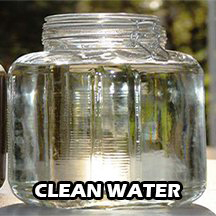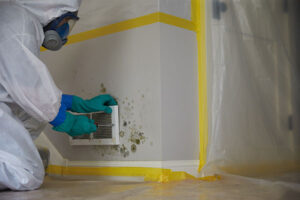Dealing with water damage can be a daunting task. It can be overwhelming and unending. When your home experiences water damage as a result of a flood or other natural disaster, it is important to act quickly in order to clean up and start the restoration process as soon as possible. That’s why it’s never wise to deal with water damage alone. You will need help from an expert water damage restoration company in Southwest Florida.
Although you may need help, it’s always better to know the different categories of water damage that you are dealing with. ServiceMaster by Wright is here to help you understand the three (3) types of water damage as designated by the IICRC (the Institute of Inspection, Cleaning, and Restoration Certification).

Category 1: Clean Water

Category 2: Grey Water

Category 3: Black Water
Water that contains significant pathogens and is grossly unsanitary. It could cause severe illness or death if ingested. Also called “black water“. Black water category includes sewer backups, flooding from rivers and streams, toilet overflows, and stagnant water that has begun to support bacterial growth.
Classes of Water Damage
Class 1 is the least harmful form of damage. Materials absorb very little of the water from this type of damage. Water damage repair is the easiest in this type of situation.
Class 2 has a fast rate of evaporation, which means that carpets and cushions may be damaged. Water damage repair is more difficult when it involves class 2 damage.
Class 3 may need to have a lot more demolition involved. It has the fastest rate of evaporation. In this case, the water may come from broken sprinklers or other overhead sources, soaking the walls and furniture. Ceilings may be wet and damaged, along with other materials such as wet insulation and behind the walls.
Class 4 requires special water restoration and water removal procedures. This type of damage may affect hardwood floors, plaster, and concrete. Special drying methods and longer dry out times are usually involved in these types of situations. This type is the most complicated and hardest to deal with.
What Is Black Water And What Should I Do About It?
- Do not run water or use toilets in affected and unaffected areas until the source of the blockage can be identified and corrected.
- Stop up all drain openings to limit the chances of further backup. Additional pressure may be needed to be applied to keep openings sealed.
- Block toilets with rags or a mop if possible.
- Stay away from affected areas so contamination doesn’t spread.
- If you absolutely have to occupy contaminated areas, wear rubber boots and gloves.
- Power down central heating or air conditioning units and cover vents in the affected areas until they can be looked at.
- Leave contaminated items in affected areas and do not take them to clean areas.
- Collect contaminated garments and place them in a container or garbage bag.
- Don’t attempt to clean anything that may have come into contact with contaminated water.
- Completely avoid any water that appears contaminated and wash immediately if you think that you may have gotten in contact with contaminated water.
- If breakers are safely accessible, turn off power in affected areas.
- If the source of the water intrusion can be determined, use the shut-off valve to stop the flow.
If you experience or your business experiences a water loss or water damage, call us first, ServiceMaster by Wright is the leading water removal and restoration company in Southwest Florida.




